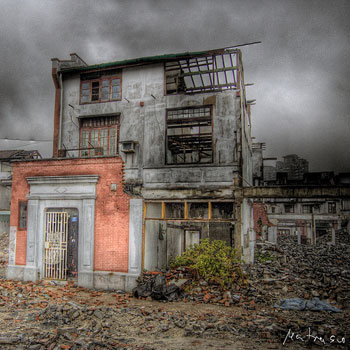Behind the smiles and neon lights: My reflections on life in Shanghai after living here for two and a quarter years – Shanghai’s society – fragmented and unequal?
Nearly everyone who is in Shanghai comes from somewhere else. People come here for a wide variety of reasons: some have come to escape from difficulties and trials at home and wish to start again. Some foreign expatriates arrive in Shanghai to advance their careers, for them working and living in this bustling megalopolis is just another rung on the career ladder and an exciting adventure, a short term sojourn. Millions of people come to Shanghai hoping that they will become rich and successful, for many it’s place for opportunities, where dreams can come true. Sadly however, most people that come to Shanghai, instead of finding riches and success, only find heartbreak, disappointment, frustration, struggle and intense loneliness; Shanghai revolves around money and business.

Photo: MK Media Productions
A Shanghainese friend once commented that Shanghai is like heaven for those who are rich but it’s hell for those who are poor. It’s difficult to disagree with that comment. Money can buy you anything that you desire, Shanghai has everything that you could possibly want to have and possessing money makes anything possible – you can even buy friends, you can even buy a wife or husband. A society that worships money and status that seeks to create this illusionary utopia inevitably excludes those who don’t have money or status. A poor person here is friendless and regarded as worthless. A rich person is surrounded by friends; he or she is considered ‘la crème de la crème’ of Shanghai society, the elite.
The elites are highly exclusive, largely consisting of people from overseas, hierarchical and self-preserving. There are various organizations in Shanghai that serve the needs of the elites primarily: these include chambers of commerce, business networking associations and social organizations. These groupings interconnected with each other enable the business elites in the city to form a powerful united group. The main purpose of these organizations is to enrich themselves through helping the people who belong to the elites become richer and more successful. These organizations are powerful and it’s in their interests, and also those of the people they serve, that Shanghai remains a money orientated, materialistic, consumerist society. These elites share similar values: it’s honorable and good to be rich and successful, it’s good to enjoy a hedonistic lifestyle and it’s a shameful disgrace to be poor; be self reliant but at the same time be part of the group and survival of the fittest. There is nothing inherently wrong with Shanghai having business elites: great talents and entrepreneurs are wealth and job creators, many people would argue that their success and prosperity will only boost Shanghai’s economy and the wealth will trickle down to benefit all of society and China as a whole. However rapidly developing market capitalism coupled with a materialistic and money driven society such as Shanghai’s creates losers as well as winners and stark inequality.
You will find many similar characteristics in other major global cities such as London and Tokyo for example but I think Shanghai’s dynamic is unique in the sense that Shanghai is the financial centre of a developing country. China’s welfare, education and health infrastructure is poorer than in developed countries, this is especially the case in the underdeveloped western and central regions of China. As a result of these factors, pursuit of money and avoiding poverty are understandable goals for many Shanghai dwellers. Society’s values are of course influenced by culture and history. Shanghai society has to be one of the most unequal societies in the world. You only have to go to Jing’an District to see vividly the reality of societal inequality. Beggars standing outside high end shopping malls that are full of shops selling designer brands.
***
Related Links
Shanghai Society: How to Win Friends on the Expat Scene
Chinese Billionaires: Wealth Gap Will Cause Instability
China's Cycle of Friends
Warning:The use of any news and articles published on eChinacities.com without written permission from eChinacities.com constitutes copyright infringement, and legal action can be taken.
All comments are subject to moderation by eChinacities.com staff. Because we wish to encourage healthy and productive dialogue we ask that all comments remain polite, free of profanity or name calling, and relevant to the original post and subsequent discussion. Comments will not be deleted because of the viewpoints they express, only if the mode of expression itself is inappropriate.
Please login to add a comment. Click here to login immediately.